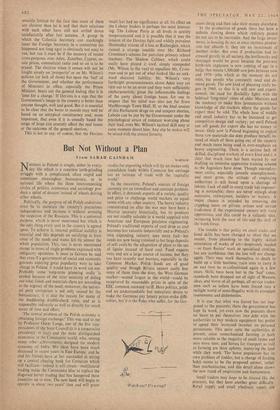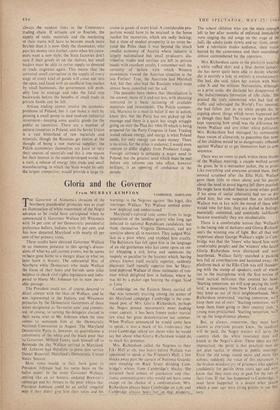But Not Without a Plan
NOTHING in Poland is simple, either in every- day life which is a ceaseless teeth-grinding struggle with a complicated, often stupid and sometimes meaningless bureaucracy, or in national life where the three interconnecting circles of politics, economics and sociology pro- duce a spiral of descent instead of wheels driving other wheels.
Politically, the purpose of all Polish endeavour must be to maintain the country's precarious independence and increase it without arousing the suspicion of the Russians. This is a universal purpose, which is never mentioned but which is the only thing every soul in the country is agreed upon. To achieve it, internal political stability is essential and this depends on satisfying at least some of the needs and wants felt by almost the whole population. This, too, is never mentioned except in terms of single problems expressed with obligatory optimism. It must in fairness be said that even if a government of social and economic geniuses enjoying .great popularity were to take charge in Poland, it would have its work cut out. Probably some long-term planning really is needed because of the utter necessity of doling out what funds and materials there arc according to the urgency of the need; moreover, the univer- sal petty corruption is not only caused by the bureaucracy, it is also the reason for many of the maddening double-check rules, and so is responsible indirectly as well as directly for much waste of time and effort.
The central problem of the Polish economy is obtaining foreign exchange.' This was said to me by Professor Oskar Lange, one of the five vice- presidents of the State Council (it is a corporative presidency in fact) and the most distinguished economist in the Communist world, who, among many other achievements, designed the modern economy of India. His ideas have been much discussed in recent years in East Europe, and he and his friends have at last succeeded in setting up a centrat clearing bank for Comecon which will facilitate--indeed it will create--multilateral trading inside the Communist bloc to replace the disguised barter trading that has hampered these countries up to now. The new bank will begin to operate in about two years' time and will grant
credits for exporting which will by no means only consolidate trade within Comecon but envisage too an increase of trade with the 'capitalist world.'
In the meantime,. Poland's sources of foreign currency are an immediate and constant problem. In effect, it demands exports of a variety, quality and price to challenge world markets on equal terms with any other country. The heavy industry concentrated on after the war may have been a Marxist necessity historically, but its products are not readily saleable in a world supplied with American and European precision engineering. Poland's traditional exports of coal drop as coal becomes less valuable industrially and as Poland's own expanding industry uses more fuel—her needs are now being trimmed to her large deposits of soft coals by the adaptation of plant to the use of lignite instead of hard coal. Food exports were and are a large source of income, but they too have recently met barriers, especially in the Common Market. Polish foods are of good quality and though Britain cannot easily buy more of them than she does, the West German market—second largest in the world—could be recaptured by reasonable prices in spite of the EEC common outward tariff. Here politics, pride and an understandable but unrealistic desire to make the Germans pay luxury prices• make diffi- culties, but it is the Poles who suffer, for the Ger-
'Watch out! Its a trap!'
mans shrug and then take their money elsewhere.
In the production of goods there has been a definite slowing down which ordinary people do not see to be inevitable. And the large invest- ments in housing do not at once increase produc- tion but absorb- it; they are an investment of another order. But even if production had in- creased greatly in all sectors, the bottlenecks and shortages would be great because the post-war birth-rate explosion is now coming of age in a bulge that means 1,500,000 new jobs between now and 1970—jobs which at the moment do not exist, but people who constantly need and de- mand goods. The new kind of planning really be- gan in 1960, so that it is still new and experi- mental; the need for flexibility fights with the habitual long-term' views of older Marxists and the tendency to make firm investments without knowledge of the markets where the goods for export must be sold. The whole base of middle and small industry has to be increased to get competitive design and variety; yet until Poland can sell goods for export she has no money to invest. Only now is Poland beginning to exploit those raw materials she does produce herself, in- stead of much of them going out of the country and much more being used in over-emphasis on heavy engineering. There is a serious lack of skilled, disciplined workers of every kind and it is clear that much time has been wasted by not drafting an intensive apprentice training scheme as the Jugoslays have done. Though unemploy- ment exists, especially juvenile unemployment, and must grow, the attitude of employing authorities is still based upon a shortage of labour. Lack of staff in every trade but engineer- ing is noticeable; there are never enough shop assistants, railwaymen, builders or waiters. A major chance is intended by removing the crippling taxes on piivate artisan and service tradesmen if the experienced owners will train apprentices, and this could be a valuable idea, increasing both the ease of life and the skill of the work-force.
The trouble is that policy on small trades and hand skills has been changed so often that no master, from plumbing to the highly skilled restoration of works of art—desperately needed —or from florists' work to specialised cooking, has any confidence that the line will not change again. They may work themselves to death to build up a little business, train sons to carry it on and then be re-collectivised again in a few years. Skills have been lost in the 'bad' times, standards have dropped out of sight of Western ideas, and worst of all perhaps, all service trades- men such as tailors have been forced into a twilight world of semi-illegality with its attendant resentments and dishonesties.
It is true that what was feared has not hap- pened to the peasants; there the government has kept its word, yet even now the peasants show no haste to put themselves into debt with the authorities to buy modern equipment but prefer to spend their increased incomes on personal possessions. This quite suits the authorities at present, since unmechanised farming is both more suitable to the majority of small farms and uses more men; and horses for transport as well as farming are there aplenty, manuring the land while they work. The horse population has its own problem of fodder, but a change of feeding habit seems to be the proposed answer, rather than mechanisation, and this detail alone shows the new trend of empiricism and humaneness.
Small traders may hope to be treated like the peasants, but they have another great difficulty. Retail supply and small wholesale supply are always the weakest links in the Communist trading chain. If artisans are to flourish, the supply of tools, materials and the marketing of their wares will have to become much more flexible than it is now. Only the shoemaker, who puts his money into leather, cares when his custo- mers want a new style; the State factories don't care if their goods sit on the shelves, but small traders must be able to revise supply to demand or trade stagnates again. This means that the universal small corruption in the supply of every stage of. every kind of goods will come out into the open, and faced with an unofficial free market by small businesses, the government will prob- ably lose its courage and take the fatal step backwards before the benefits of small trade in private hands can be felt.
Artisan trading cannot resolve the economic problems of Poland, but it can make a start by priming a small pump to feed medium industrial investment—keeping some quality goods for the public as incentives. There are a number of natural resources in Poland, and the Soviet Union is a vast hinterland of raw materials and minerals, though the Russians get restive at the thought of being a raw material supplier; the Polish economists themselves are keen to vary their sources of materials and this is one reason for their interest in the underdeveloped world. As a start, a release of energy into trade and small manufacturing, in which the State would be only the largest competitor, would provide a large in-
crease in goods of every kind. A'considerable pro- portion would have, to be retained in the home market for incentives, which are sadly lacking; but a state of modest prosperity is no more be- yond the Poles than it was beyond the much smaller economy of Austria where industry is largely nationalised but small producers, dis- tributive trades and services are left in private hands with excellent results. I remember well the certainty of failure with which Western economists viewed the Austrian situation in the late Forties! True, the Austrians had Marshall Aid, but they also had the Russians which must almost have cancelled out, the aid.
The peasants have shown that liberalisation is the answer, more of it and not less, with planning restricted to a basic rationing of available materials and investments. The Polish econom- ists, Marxists to a man in belief if not in action, know this, but the Party has not picked .up the message and there is a quiet but tough struggle going on over the Plan for 1966-70 which is being prepared for the Party Congress in June. Trading would release energy, and energy is 'what Poland needs, for only energy can make money. There is no crisis, for the crisis is endemic; I would even venture to differ slightly from Professor Lange. Foreign currency is certainly a major need in ' Poland, but the greatest need which must be met before any reforms can take effect, however brilliant, is an upswing of confidence in the people.



































 Previous page
Previous page